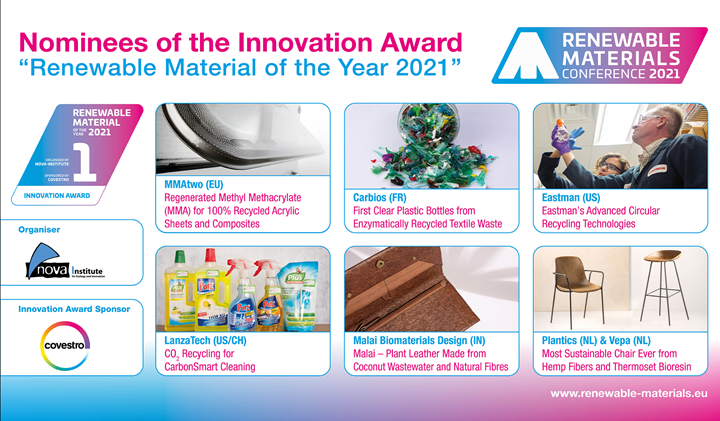Advanced biocomposite technologies nominated for “Renewable Material of the Year” Innovation Award
Six nominees chosen for Renewable Materials Conference award, including India-based Malai Biomaterials Design for its plant leather biocomposite, and Netherlands-based Vepa and Plantics’ hemp chair.

Six nominees for the Renewable Material of the Year Innovation Award. Photo Credit: Renewable Materials Conference
The Renewable Materials Conference 2021, the follow-up event to the 13th International Conference on Bio-based Materials, announced on April 29 the six nominees chosen by its advisory board for its . The comprehensive award, sponsored by (Leverkusen, Germany), looks for brand new applications that aim to avoid or substitute fossil-based virgin materials (produced either from biomass, directly via CO2, utilization or recycling) and are either already on the market, or will be in the near future.
Nominated out of 36 submissions, two in particular, Malai Biomaterials Design (Kerala, India) and Dutch furniture manufacturer Vepa (Hoogeveen, Netherlands) and Plantics (Netherlands), apply composites; all nominees will present their new technologies and applications at the May 18-20 online event. The award winners will be chosen by the conference participants online on the second day of the conference.
uses malai, a novel biocomposite material based on bacterial cellulose cultivated on wastewater from mature coconuts blended with fibers from banana stem, hemp and sisal. It is made without any oil-based or toxic substances, is bio-based and home compostable. Similar to leather in its properties and appearance, the material is used for accessories such as bags and purses. The company works with wastewater from coconut processing plants in Southern India. A small coconut plant disposes of about 4,000 liters of this water per day. Such wastewater is usually discharged into the environment, where it acidifies the soil. Malai collects and sterilizes the water, which can then be used as feed for the bacteria. This bacterium produces nano-cellulose sheets, which are further enriched with natural fibers to obtain the final material.
Dutch furniture manufacturer is said to be the first in the world to launch a collection of chairs with a shell of a biomaterial made of hemp fiber and bioresin. Both are fully biological, plant-based and recyclable. Vepa says the bio-based resin and material are part of a new family of bio-based materials that has been developed by and is patented worldwide for many different applications. Plantics and Vepa collaborated intensively for two years to turn the biomaterial into a high-quality seat shell. The collection is produced entirely in the Netherlands and currently includes chairs and bar stools. The production process absorbs more CO2 than it emits. In addition, the chairs are designed in such a way that the various parts are easy to separate and materials can reportedly be reused endlessly.
The four additional nominees include:
- EU-funded project, , which obtains new polymers from regenerated methyl methacrylate (MMA) for 100% recycled acrylic sheets and composites.
- (France), which claims to be the first company that has developed biological processes to revolutionize the end-of-life of plastics and textiles. The enzymatic recycling technology reportedly deconstructs any type of PET plastic waste into its basic components (monomers) which can then be reused to produce new PET plastics of virgin quality.
- (Kingsport, Tenn., U.S.), with new molecular recycling technologies that break down plastic waste into molecular building blocks and rebuild them into new materials like carpets and textiles, for a complete circular solution.
- A launched a range of liquid cleaning products containing LanzaTech (Skokie, Ill., U.S.) CarbonSmart Ethanol as part of Migros (Zurich) Plus Oeco Power and Potz cleaning ranges. The CarbonSmart Ethanol is produced from recycled carbon from steel emissions.
The “Renewable Material of the Year” innovation award is sponsored by Covestro. Neste, Sorona, SUGAR ENERGY and UPM support the conference as Gold Sponsors, Alfa Laval, FKuR, MMAtwo, Photanol/Renolit as Silver Sponsors and LanzaTech as a Bronze Sponsor.
Related Content
Bladder-assisted compression molding derivative produces complex, autoclave-quality automotive parts
HP Composites’ AirPower technology enables high-rate CFRP roof production with 50% energy savings for the Maserati MC20.
Read MorePlant tour: Airbus, Illescas, Spain
Airbus’ Illescas facility, featuring highly automated composites processes for the A350 lower wing cover and one-piece Section 19 fuselage barrels, works toward production ramp-ups and next-generation aircraft.
Read MoreOtto Aviation launches Phantom 3500 business jet with all-composite airframe from Leonardo
Promising 60% less fuel burn and 90% less emissions using SAF, the super-laminar flow design with windowless fuselage will be built using RTM in Florida facility with certification slated for 2030.
Read MorePlant tour: Teijin Carbon America Inc., Greenwood, S.C., U.S.
In 2018, Teijin broke ground on a facility that is reportedly the largest capacity carbon fiber line currently in existence. The line has been fully functional for nearly two years and has plenty of room for expansion.
Read MoreRead Next
Scaling up, optimizing the flax fiber composite camper
Greenlander’s Sherpa RV cab, which is largely constructed from flax fiber/bio-epoxy sandwich panels, nears commercial production readiness and next-generation scale-up.
Read MoreCutting 100 pounds, certification time for the X-59 nose cone
Swift Engineering used HyperX software to remove 100 pounds from 38-foot graphite/epoxy cored nose cone for X-59 supersonic aircraft.
Read MoreCeramic matrix composites: Faster, cheaper, higher temperature
New players proliferate, increasing CMC materials and manufacturing capacity, novel processes and automation to meet demand for higher part volumes and performance.
Read More












